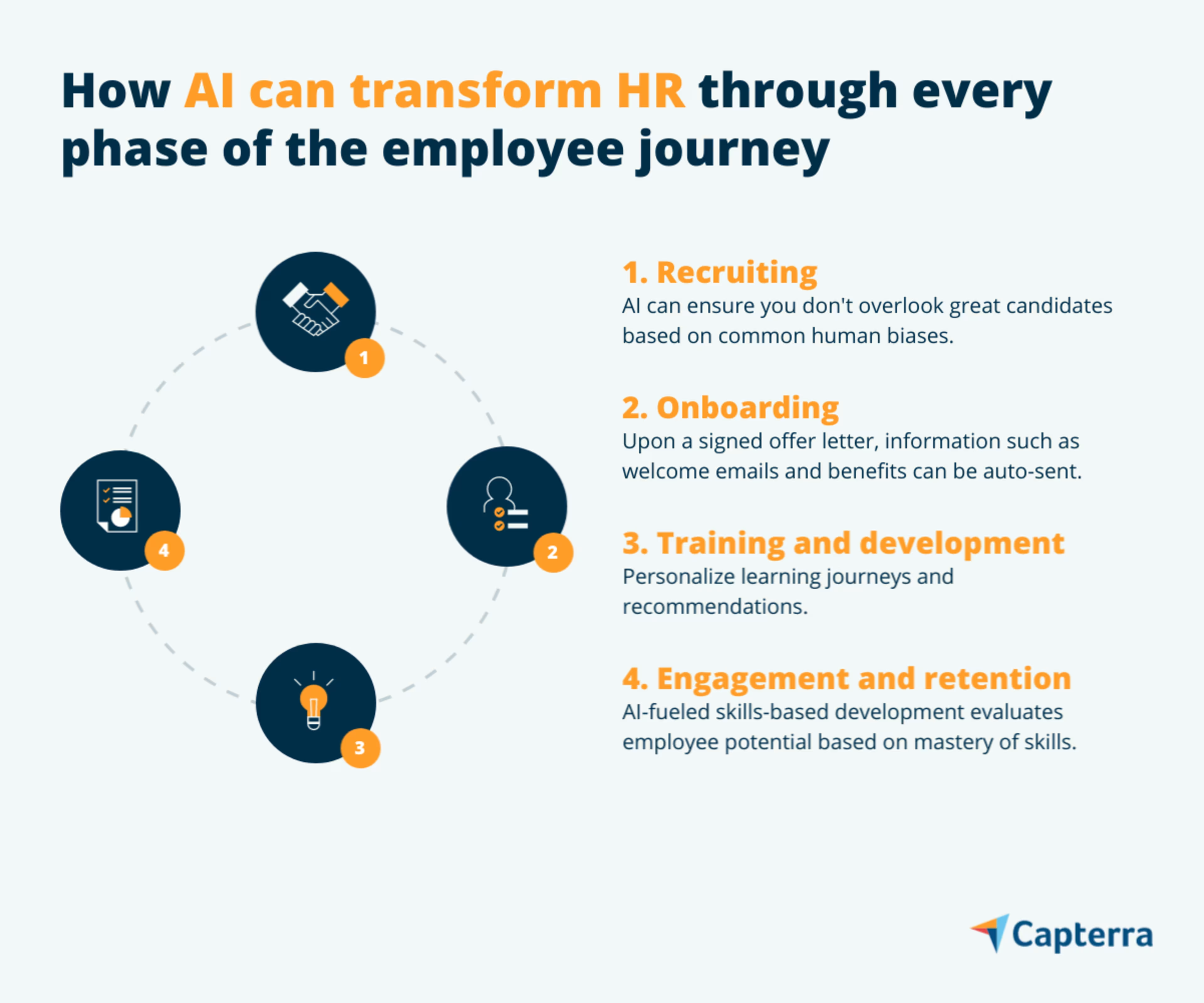Expert on the future of HR walks us through AI's impact on every phase of the employee lifecycle.
/ AN INTERVIEW WITH LARS SCHMIDT
The following summarizes an interview facilitated by Capterra team member Kyle Rich and HR expert Lars Schmidt. This conversation was edited for length and clarity.
Recruiting hasn't changed much in 20 years, says HR leader and futurist Lars Schmidt. The way businesses recruit today is just a digital version of the way they recruited when print newspaper ads and paper resumés were the norm. Artificial intelligence (AI) is already fundamentally changing that.
Human resource leaders need to prepare to incorporate AI across every stage of the employee lifecycle—from recruitment to exit. Rather than fearing this evolution, HR professionals should embrace the potential of AI to streamline and optimize processes, improve employee experiences and satisfaction, and drive business success.

Step into the future of HR with Schmidt, who has a mission to accelerate innovation in HR, and explore how AI can be used in recruitment, onboarding, training and development, performance management, and employee engagement and retention.
Recruiting: The employee phase most open to disruption from AI
According to Schmidt, AI will be able to do two important things for recruiters: First, AI—if done right—can eliminate the biases that humans inevitably have when they review resumés and interview candidates.
Second, AI can search for and find "markers" of skills that align with success measures for roles that might not be traditionally linked. Whereas a human might tell a candidate: "You've never done this kind of thing before, sorry," AI might see that this candidate fits the profile of a top performer.
"We're already seeing companies … use AI-based games to assess potential employees [and] identify the traits, skills, and capabilities that are proven markers of success," says Schmidt.
AI can look into the different aspects of somebody's background and gauge how they might align with a new role in ways that humans can't. "That's a huge thing," says Schmidt.
Onboarding: Moving toward AI through automation
Not too long ago, every step in the onboarding process was done manually. The recruiter would finalize the offer terms, the HR coordinator would send paperwork to the new hire, and the hiring manager and hiring team would reach out to welcome them before their start date.
"All that is a hugely important time in a new hire's journey," says Schmidt. "When the employment market is tight—as it was during the Great Resignation—your new hires are very vulnerable. You have to be careful not to lose them through careless communications or failure to follow up."
That's why new onboarding tools are so useful, as they automate every step in the process, says Schmidt. Businesses can now build a cadence where a congratulatory letter is triggered to go out within one day of an offer letter being signed, a welcome video from the CEO after that, and within five days important materials about benefits.
"There's so much that we can do to make sure we don't drop any balls during both the pre-boarding and the onboarding processes," says Schmidt. "And when these tools are infused with AI capabilities, they're very rich indeed."


Lars Schmidt
HR leader and futurist
Training and development: Fertile ground for AI
Employee training and development professionals are embracing AI because it allows them to personalize learning journeys. Schmidt runs the Amplify Academy[1], which uses a special learning management system to create individual learner recommendations. "Like Netflix's famous recommendations engine is personalized to each viewer, we're seeing that in business learning, too," says Schmidt. "The AI even allows us to customize content on the fly as the learner progresses through the material."
This helps with compliance as well, as many businesses have required courses for employees, depending on their roles. Take new employees of financial institutions. "You would have certain courses you would have to pass for governance reasons," Schmidt says.
But because you already possess a substantial body of knowledge, you might not have to sit through an entire course. If the AI engine detects that you are demonstrating mastery of the content, you might be able to opt out of certain parts of the learning. "This was impossible on previous learning platforms," he says.
Engagement and retention: Getting the very best from employees
Although it's still a long way from being fully embraced, AI-fueled skills-based retention and development is going to be a big component in the new world of work, says Schmidt.
Instead of solely relying on tenure or job titles, skills-based development evaluates employees based on their mastery of relevant skills, their performance, and their potential to contribute to higher-level responsibilities. This approach encourages a more objective and merit-based process, promoting a culture of continuous learning and growth.
"We must understand, when we’re looking to develop talent, that it's not just the roles that our employees have, but the skills they have and the skills that they're interested in building, that should determine their future careers," says Schmidt.
"We will certainly leverage AI to help us manage this, and it will create a massive unlocking of potential talent as employees will be able to move both vertically and laterally within businesses."
Make AI an essential part of HR
From improved recruitment processes to personalized learning and development, AI has already found a home in essential HR functions and is likely to be used for even more HR tasks and responsibilities as the technology matures.
"AI tools are already out in HR departments, and we're going to see them being used much, much more in the coming months and years,"
Lars Schmidt
For more Capterra insights on human resources and the future of work, check out these pieces:

